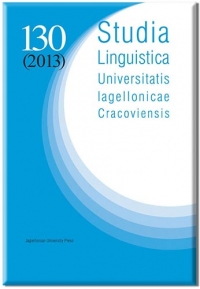APPLYING THE THEORY OF PLANNED BEHAVIOUR TO ACCOUNT FOR STUDENTS’ CHOICE OF A TARGET ACCENT (PART 1)
APPLYING THE THEORY OF PLANNED BEHAVIOUR TO ACCOUNT FOR STUDENTS’ CHOICE OF A TARGET ACCENT (PART 1)
Author(s): Krzysztof PrzygońskiSubject(s): Sociolinguistics, Behaviorism, Evaluation research, Philology
Published by: Wydawnictwo Uniwersytetu Jagiellońskiego
Keywords: theory of planned behaviour; language attitudes; attitude–behaviour relations; target pronunciation model;
Summary/Abstract: Bearing in mind the importance of attitude in sociolinguistic research and its huge theoretical potential for accounting for various language behaviours, it is surprising to see numerous misconceptions concerning this construct and its conceptualization as well as criticism as to its role in predicting and explaining speech behaviour (cf., for instance, Cargile, Giles 1997: 195; Edwards 1999: 109; Ladegaard 2000: 229–230; Garrett 2001: 630; Soukup 2012; Taylor, Marsden 2014). The author claims that attitude research can still prove very insightful and helpful in sociolinguistic theory building, but to do so, one needs to reconceptualize attitude along the reasoned action approach on the foundations of which the theory of planned behaviour rests. The theory posits that attitude is one of the three general predictors having a sufficient explanatory and predictive power in the case of most human behaviours.
Journal: Studia Linguistica Universitatis Iagellonicae Cracoviensis
- Issue Year: 136/2019
- Issue No: 2
- Page Range: 169-179
- Page Count: 12
- Language: English

